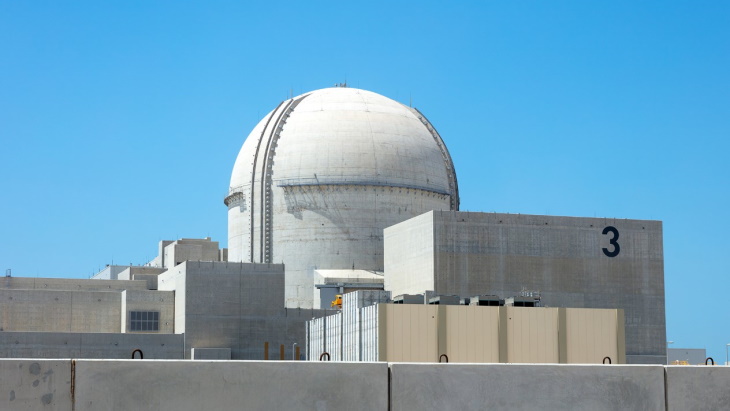Third unit completed at Barakah
Construction of the third unit at the UAE's Barakah nuclear power plant has been completed, and the unit is on track to start up in 2023, the Emirates Nuclear Energy Corporation (ENEC) has announced today on the sidelines of COP26 in Glasgow.

Barakah 3 - construction complete (Image: ENEC)
Barakah is the Arab world's first multi-unit operating nuclear power plant, located in the Al Dhafra region of Abu Dhabi. Unit 1 began commercial operation in April this year; unit 2, which started up in August, has been connected to the UAE grid and is currently undergoing power ascension testing. For unit 3, the focus will now turn to completing the operational readiness preparations, testing, regulatory inspections, and international assessments needed to obtain an operating licence from the UAE's Federal Authority for Nuclear Regulation (FANR).
The announcement, made during Energy Day at the United Nations climate change conference, "demonstrates the UAE's progress in transitioning to cleaner energy sources, rapidly decarbonising the power sector, cutting carbon emissions, and increasing power supply to meet the growing electricity demand," ENEC said. The UAE - with the endorsement of the member states of the UN's Asia Pacific group - is bidding to host COP28 in 2023.
ENEC Managing Director and CEO Mohamed Al Hammadi said the completion of construction at unit 3 demonstrates the "steady progress" of the Barakah project. "As the world gathers at COP26 in Glasgow, Scotland, the need for concrete actions to tackle climate change is indisputable and urgent. The Barakah plant, with its rapid decarbonisation of the power sector, is delivering climate solutions today and with unit 3 construction now complete, we are progressing smoothly towards supplying a quarter of the UAE's electricity needs completely carbon free," he said.
"By developing nuclear energy in the UAE, ENEC is enabling sustainable growth and prosperity for the nation through the provision of abundant, 24/7 clean electricity, whilst underpinning intermittent renewables and creating a bridge to other clean energy technologies like green hydrogen. We are tackling climate change directly today and will do for the next 60 years to come," he added.
Barakah unit 3 has already completed individual and combined system tests, including cold hydrostatic testing, structural integrity test, integrated leak rate test and hot functional test, as part of the first phase of its initial testing programme. In addition to FANR's review process, the unit and its operating team will now undergo a number of assessments by independent international nuclear energy experts from the World Association of Nuclear Operators, ENEC said.
Construction of the four APR-1400 units at Barakah began in 2012 and the plant as a whole is now more than 96% complete, ENEC said. Construction of unit 3 began in 2014.
Researched and written by World Nuclear News
- China Institute of Atomic Energy
- Nuclear Power Institute of China
- Southwestern Institute of Physics
- China Nuclear Power Operation Technology Corporation, Ltd.
- China Nuclear Power Engineering Co., Ltd.
- China Institute for Radiation Protection
- Beijing Research Institute of Uranium Geology (BRIUG)
- China Institute of Nuclear Industry Strategy (CINIS)
- China Nuclear Mining Science and Technology Corporation


